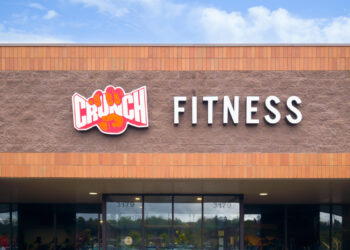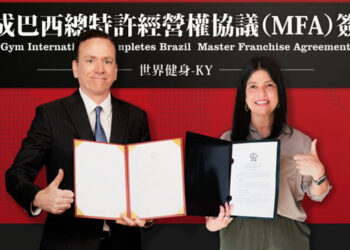On April 18, 1775, Paul Revere famously rode to Portsmouth, New Hampshire, to warn the town that the British were coming. On that day, history was made.
Today, a fitness franchise is also trying to make its stamp on history in Portsmouth. Crunch Franchise, headquartered in the historic seaport, is hoping to become known as the top franchisor on the planet, specifically in the high-volume, low-price (HVLP) space.
“I have been in the industry for 27 years, and though I think we have many wonderful concepts across our industry, I have never seen a model that can do what ours can in the long term,” said Ben Midgley, the CEO and co-founder of Crunch Franchise.
When a potential Crunch franchisee begins looking into the model, he or she flies out to Portsmouth to meet with the Crunch Franchise team, composed of 12 full-time staff. During their visit, candidate owners learn exactly what makes Crunch Franchise different from other low-price brands like Planet Fitness or Youfit.
“Our model is the most competitive and progressive model available to investors,” said Midgley. “What we have effectively done is segment the value space in two categories: Low-price clubs, that are fitness only; and HVLP clubs, that provide many more amenities such as group fitness, personal training and functional training areas, for the same membership prices as less-equipped clubs. Because of this we have attracted a very sophisticated level of investors.”
The idea for this progressive model started in 2010. That year New Evolution Ventures (which co-owns Crunch with private-equity firm Angelo Gordon), led by Mark Mastrov, Jim Rowley and Mike Feeney, began toying with the idea of spinning Crunch into a franchise.
“We wanted to go into a low-price space, but we didn’t want to be like Planet Fitness, where it’s just fitness equipment, no group fitness, no personal training,” explained Midgley.
In fact, Midgley had worked at Planet Fitness as its president prior to joining Crunch. He thought the low-price model could be executed better than current market options, offering more value for both franchisees and members.
For $9.95 per month, members of a Crunch Franchise location gain access to state-of-the-art equipment, functional training areas featuring custom-designed equipment from Throwdown, and free introductory personal training sessions. Members can also opt for a Peak Membership for $19.95 per month, which adds on group fitness classes, unlimited guest passes, access to other franchise clubs and unlimited tanning and hydromassage.
These offerings provide the customer with much more than is typical of HVLP or low-price brands, which more commonly boast just basic amenities like locker rooms, cardio equipment and free weights. Group X, personal training and functional training spaces are typically left out of the equation.
“When we came into the industry we thought: ‘How can we give the consumer more for the same $10 to $20 per month?’” recalled Midgley. “That involved a lot of testing.”
Test number one concerned group fitness. In Crunch Franchise’s first location in Oregon, they took 1,400 square feet and dedicated it to group fitness classes. “Pretty soon we had 85 people in that room,” said Midgley. “We had no idea it was going to work that well. And then it grew from there.”
For Crunch Franchise, one of the biggest differentiating factors to consumers, when compared to other HVLP models, is its proprietary Group X classes. Ninety-nine percent of the class schedule is filled with original material thanks to its partnership with Crunch Corporate, which works closely with the Crunch Franchise team to develop content that can be implemented with franchisees.
“We have 28 classes that we’ve developed, and that’s all served up through what we call Classic Training, which is group fitness,” explained Craig Pepin-Donat, co-founder and executive vice president of Crunch Franchise. “When you go to other HVLP models, most of them don’t have that, and if they do, it’s not even close to what we offer.”
Pepin-Donat previously worked as the executive vice president of sales and marketing for 24 Hour Fitness and as president of New York Health and Racquet Club. But, his passion for the Crunch Franchise model in particular shines through.
“We didn’t convert the current Crunch [Corporate] model to franchise,” explained Pepin-Donat. “We just took what Crunch originally was great for, which was this really slick, cool, trend-setting company, and evolved it for the franchise business. I really think it is the best brand I’ve ever worked with. And it’s not just because of the brand, it’s because of the people.”
Crunch Franchise’s people include its executive team, support staff and 45 individual franchisees. Almost every franchisee owns 10 or more clubs, allowing Crunch to open 120 clubs nationwide, with 500 in development, since its inception.
According to Midgley, Crunch’s motto is “staying small to grow large,” and that is exemplified in its franchisee-to-clubs-owned ratio.
“We stay small to grow large because that allows us to have much closer relationships with our franchisees,” explained Midgley. “It allows us to stop reacting to the industry, to be more innovative. If we want to do something unique or solicit feedback we can literally be on the phone with all franchisees in a day, if we have to, and have the ability to have fairly meaningful conversations.”
As a result of this small, tight-knit franchisee group, Midgley explained the owners have become like family. There is frequent networking, problem solving and camaraderie among the group, in addition to constant communication with Crunch Franchise corporate.
Vince Julian, a Crunch franchisee with rights in Atlanta, Orlando and the West Coast of Florida, explained he was drawn to the company because it felt like he was entering a partnership, versus a contract.
Julian recalled, “We were doing a conversion of an existing club into a Crunch. The previous club had a Silver Sneakers program, so I brought it to Crunch and asked Ben, ‘What do you think?’ He said, ‘Well, it’s not really part of the model, but if you think it’s going to work, try it.’ All of our Silver Sneakers classes have 50 to 70 people in them now.’”
At Crunch Franchise, all franchisee suggestions are considered. But that doesn’t mean they’re all implemented. “We have disagreements with franchisees all the time, but I’d frame it more like disagreeing with a family member,” reiterated Midgley. “The overriding principle is that you’re family, and it’s going to work out and it’s okay to have disagreements — that’s how you come to the right balance.”
Midgley explained he goes to bed at night happy with the support systems he, Pepin-Donat and the Crunch Franchise staff have developed for franchisees. As support, franchisees are provided with over 170 hours of training, full-service marketing, development, operations and group fitness teams, personal training programs, proprietary Camp Crunch small group training programs, and guidance on financing, financial analysis, design, construction and more.
They also receive manuals on operations, construction and group fitness, in addition to brand guidelines and an in-house intranet, a computer network that allows franchisees to share information, communicate and solve problems.
“When the franchisee comes [on board], they train for four to six months,” explained Pepin-Donat. “I’d say it’s over 150 hours of training in New York, delivered by me, which starts with classroom training, foundations training, and training with some of our other team members including our operations manager, our senior vice president of development, director of personal training and director of Classic Training (Group X).”
During Crunch University, newcomers learn exactly why the model Crunch Franchise follows works. “By providing all of those additional services, like personal training, functional training and group exercise, you’re really enhancing the revenue diversity of the clubs,” explained Midgley. “As long as you can make it manageable for your franchisees, it gives them a much more competitive offering, and it gives them a little extra security in terms of diversity of revenue.”
Although combining these offerings under the umbrella of a HVLP brand has been challenging, Midgley believes it’s worth it.
“It’s not easy, but [the model] works well,” said Midgley. “And the challenges are the fun part. Business is competitive and you have to thrive on that and enjoy it. Then you’ll have just that much more of a chance to exceed.”
With that attitude, maybe Crunch Franchise will indeed make history in Portsmouth, New Hampshire, after all, as one of the fastest-growing, top franchisors on the planet.
“We’re not afraid to go into any market. We’re not afraid to go against any competitor,” said Pepin-Donat. “Our goal is tremendous growth in the U.S. It’s going to be global domination. That’s our goal.”
Stay ahead in the fitness industry with exclusive updates!
Rachel Zabonick-Chonko is the editor-in-chief of Club Solutions Magazine. She can be reached at rachel@peakemedia.com.



















